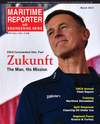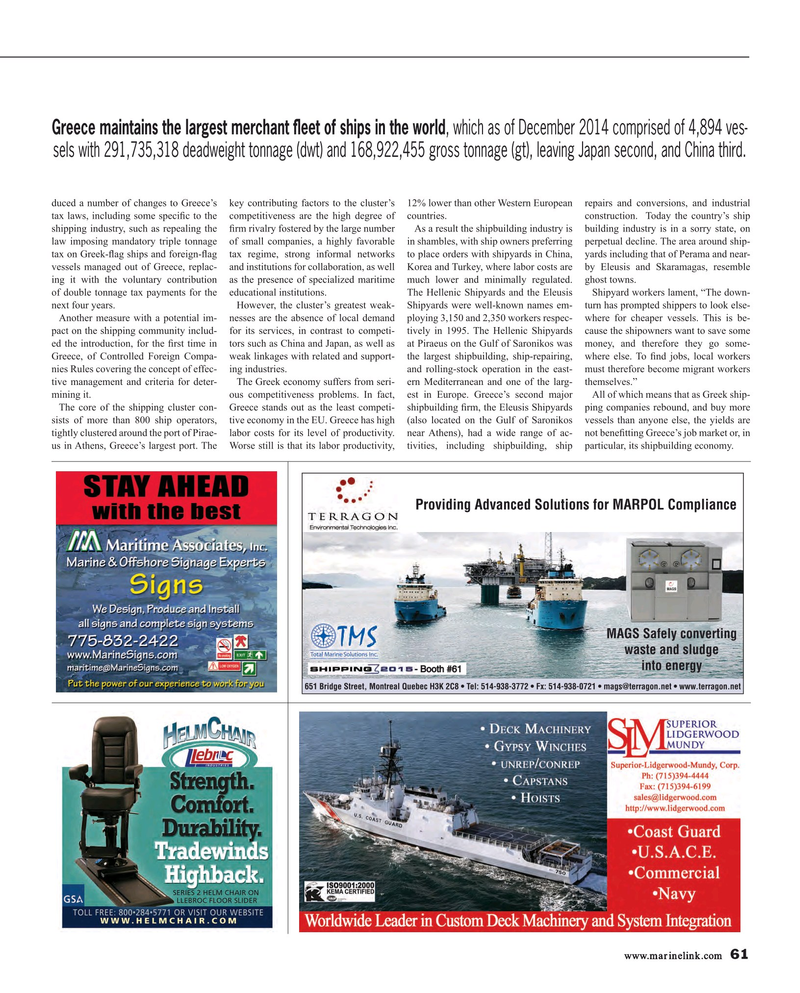
Page 61: of Maritime Reporter Magazine (March 2015)
U.S. Coast Guard Annual
Read this page in Pdf, Flash or Html5 edition of March 2015 Maritime Reporter Magazine
Greece maintains the largest merchant ? eet of ships in the world, which as of December 2014 comprised of 4,894 ves- sels with 291,735,318 deadweight tonnage (dwt) and 168,922,455 gross tonnage (gt), leaving Japan second, and China third.
duced a number of changes to Greece’s key contributing factors to the cluster’s 12% lower than other Western European repairs and conversions, and industrial tax laws, including some speci? c to the competitiveness are the high degree of countries. construction. Today the country’s ship shipping industry, such as repealing the ? rm rivalry fostered by the large number As a result the shipbuilding industry is building industry is in a sorry state, on law imposing mandatory triple tonnage of small companies, a highly favorable in shambles, with ship owners preferring perpetual decline. The area around ship- tax on Greek-? ag ships and foreign-? ag tax regime, strong informal networks to place orders with shipyards in China, yards including that of Perama and near- vessels managed out of Greece, replac- and institutions for collaboration, as well Korea and Turkey, where labor costs are by Eleusis and Skaramagas, resemble ing it with the voluntary contribution as the presence of specialized maritime much lower and minimally regulated. ghost towns. of double tonnage tax payments for the educational institutions. The Hellenic Shipyards and the Eleusis Shipyard workers lament, “The down- next four years. However, the cluster’s greatest weak- Shipyards were well-known names em- turn has prompted shippers to look else-
Another measure with a potential im- nesses are the absence of local demand ploying 3,150 and 2,350 workers respec- where for cheaper vessels. This is be- pact on the shipping community includ- for its services, in contrast to competi- tively in 1995. The Hellenic Shipyards cause the shipowners want to save some ed the introduction, for the ? rst time in tors such as China and Japan, as well as at Piraeus on the Gulf of Saronikos was money, and therefore they go some-
Greece, of Controlled Foreign Compa- weak linkages with related and support- the largest shipbuilding, ship-repairing, where else. To ? nd jobs, local workers nies Rules covering the concept of effec- ing industries. and rolling-stock operation in the east- must therefore become migrant workers tive management and criteria for deter- The Greek economy suffers from seri- ern Mediterranean and one of the larg- themselves.” mining it. ous competitiveness problems. In fact, est in Europe. Greece’s second major All of which means that as Greek ship-
The core of the shipping cluster con- Greece stands out as the least competi- shipbuilding ? rm, the Eleusis Shipyards ping companies rebound, and buy more sists of more than 800 ship operators, tive economy in the EU. Greece has high (also located on the Gulf of Saronikos vessels than anyone else, the yields are tightly clustered around the port of Pirae- labor costs for its level of productivity. near Athens), had a wide range of ac- not bene? tting Greece’s job market or, in us in Athens, Greece’s largest port. The Worse still is that its labor productivity, tivities, including shipbuilding, ship particular, its shipbuilding economy.
Providing Advanced Solutions for MARPOL Compliance
MAGS Safely converting waste and sludge into energy - Booth #61

 60
60

 62
62
